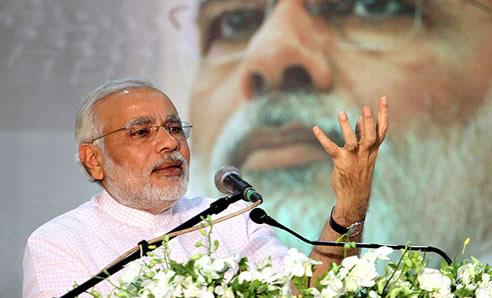Modi Takes Over after Landslide Win
Daljit Sehbai
India's Bhartiya Janata Party led by Narinder Modi stormed to power with a landslide victory in the General Elections and astounded political pundits by winning an absolute majority with 282 seats in the 543-seat Lok Sabha (lower house of parliament). It was the first time in 30 years that any party has won a majority on its own. With its NDA allies winning another 55 seats, the new Modi government has a large majority to enable it to provide India a stable government for the next 5 years.

What has been described as the world's largest exercise in democracy, Indian General Election took place in 9 Phases, starting on 7 April 2014, and finishing with the final polling day on 12 May. In a country of nearly 1.26 billion people, with an electorate of 814 million, three times larger than that of the United States, voters turned out in large numbers. Turnout, in excess of 550 million, was a record total of over 66%. This was an incredible result in a massive country with some difficult and inaccessible terrains. In some areas, turnout exceeded 70% as few people wanted to be left out from exercising their right to choose the next government of their country. United States hailed India's 2014 elections as the "largest in human history".
Many Indians were disappointed with the performance of the last Congress government that presided over a decade of unrestrained corruption, scams, and scandals. Nation was energised by the emergence of Narinder Modi, the un-corruptible Hindu Nationalist leader, who had ruled the state of Gujarat as its Chief Minister for the last 12 years. During his tenure, the state experienced an unprecedented period of economic growth. But he has been accused by his critics for not doing enough to stop the massacre of Muslims during the 2002 Hindu-Muslim riots in Gujarat. To many others, he symbolises as a leader who can provide an honest and efficient government that India needs. Indians hope that he will be able to accelerate the country's economic growth and provide strength and security at borders with China and Pakistan. They also believe that Narinder Modi can be an effective leader who can tackle corruption and improve the country's chances of economic recovery and help the millions whose lives are blighted by poverty. Someone who knows him well and has worked with him told a foreign journalist: "If you put a proposal to Narinder Modi, he will either say Yes or No. He never says maybe."
Congress government's performance has been so dismal that the country now needs a jolt to overcome the problems of corruption, inefficiency, and scams. A Modi-led government may provide that jolt.
Religious riots in Gujarat took place 12 years ago. Since then the state has seen a period of communal peace and a creditable economic growth under Narinder Modi. Voters gave him the benefit of doubt. Moreover, many remember 1984 riots in Delhi, when thousands of Sikhs were killed. Congress government of Rajiv Gandhi did nothing to stop this massacre that was instigated and led by Congress leaders who have still not been brought to justice.
Exit polls, after the last polling booths closed on 12 May, and many forecasters predicted that BJP + Allies may get as many as 300 seats, but no one thought that BJP alone will get a clear majority or that Congress Party that has ruled India for more that 6o years since India's independence, will be reduced to winning only 44 seats against 206 that it held in the last parliament.
In the crucial state of Uttar Pradesh, BJP won 71 out of 80 seats. It won only 10 seats out of 80 in 2009. Congress slumped to only 2 seats against 21 it won last time. Samajwadi Party, the ruling party in the state, won only 5 seats against 23 it had before. BSP, another major regional party led by Mayawati, which had won 21 seats five years ago, did not manage to win a single seat. This was a major triumph for BJP that even its leaders and supporters did not expect.
Similarly, in Maharashtra, BJP + Allies won 41 out of 48 seats. Congress won only 2 against 17 it won in 2009, while its partner, NCP, lost all the 8 seats it had won five years ago. BJP had a similar success in Madhya Pradesh and Bihar. In Gujarat, Rajasthan, and Delhi, however, BJP won all the seats in a clean sweep.
Narinder Modi hailed this victory as a clear mandate and promised to do his best to make the 21st century India's century. He said "India has won. This is a victory for the people of India. Good days will soon be with us."
|
